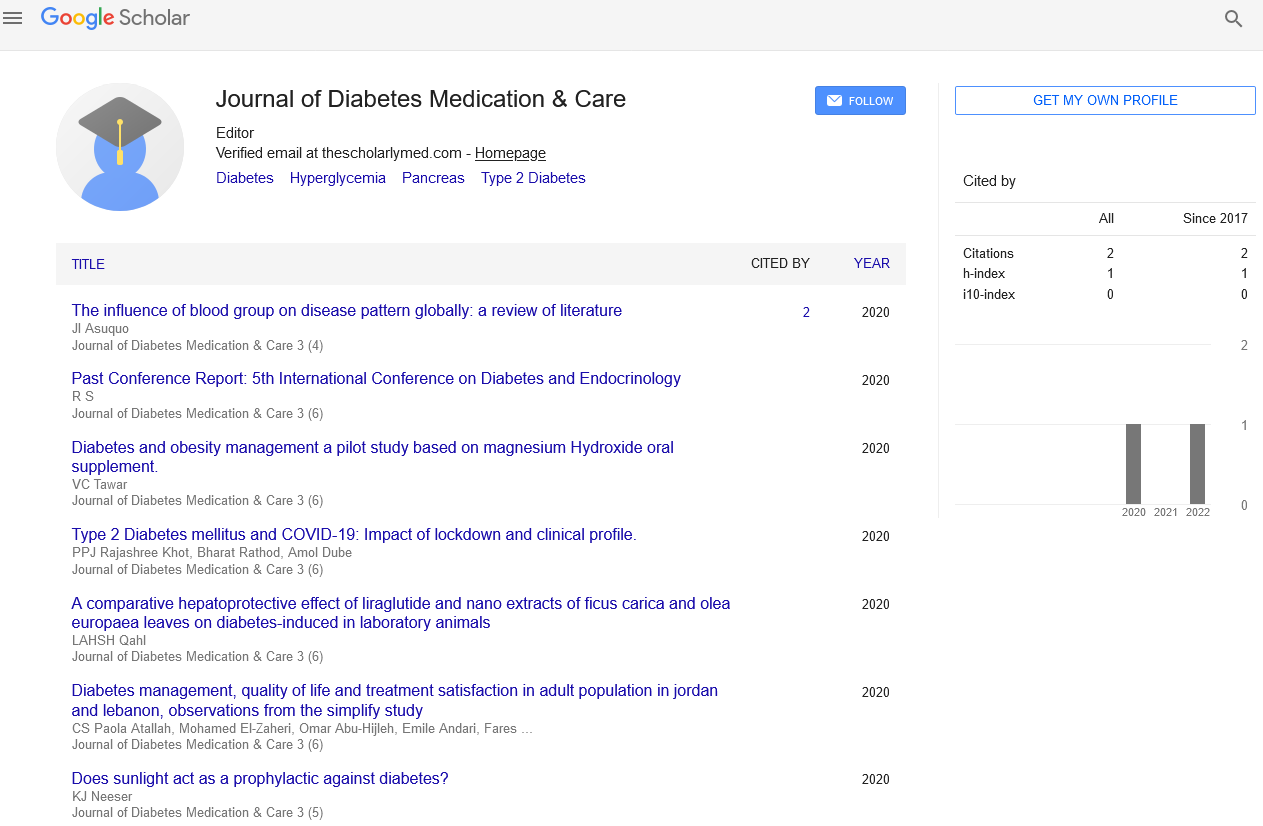Perspective - Journal of Diabetes Medication & Care (2024) Volume 7, Issue 2
Revolutionizing Diabetes Management: The Promise of Gene Therapy
- Corresponding Author:
- Yi Ra
Department of Diabetes, Central South University, Changsha, China
E-mail: yira123@qq.com
Received: 04-Mar-2024, Manuscript No. JDMC-24-128941; Editor assigned: 07-Mar-2024, PreQC No. JDMC-24-128941 (PQ); Reviewed: 21-Mar-2024, QC No. JDMC-24-128941; Revised: 29-Mar-2024, Manuscript No. JDMC-24-128941 (R); Published: 08-Apr-2024, DOI: 10.37532/JDMC.2024.7(2).186-187
Introduction
Diabetes mellitus, a chronic metabolic disorder characterized by abnormal glucose levels, poses a significant global health challenge. Traditional management strategies primarily focus on insulin therapy, oral medications, and lifestyle modifications. However, emerging advancements in gene therapy offer a revolutionary approach to diabetes management. By targeting the underlying genetic causes of the disease, gene therapy holds the potential to provide long term solutions and even a cure. This article delves into the evolving landscape of gene therapy for diabetes, exploring its mechanisms, current progress, challenges, and future prospects.
Description
Understanding gene therapy and diabetes
Gene therapy involves the manipulation of genetic material to treat or prevent disease. In the context of diabetes, this approach aims to address the underlying genetic abnormalities that contribute to the development and progression of the condition. Two main types of diabetes, type 1 and type 2, have distinct genetic components that researchers are targeting through gene therapy interventions.
Type 1 diabetes results from autoimmune destruction of pancreatic beta cells, which are responsible for producing insulin. Gene therapy approaches for type 1 diabetes often focus on restoring beta cell function or replacing damaged cells. One promising strategy involves using viral vectors to deliver genes encoding insulin or factors that promote beta cell regeneration. By introducing these genes into the pancreas, researchers aim to enhance insulin production and improve glucose regulation.
On the other hand, type 2 diabetes is characterized by insulin resistance and impaired insulin secretion. Genetic factors play a significant role in the development of insulin resistance and beta cell dysfunction. Gene therapy strategies for type 2 diabetes may involve targeting genes involved in insulin signalling, glucose metabolism, or pancreatic function. By modulating the expression of these genes, researchers aim to improve insulin sensitivity and restore normal glucose homeostasis.
Current progress in gene therapy for diabetes
While gene therapy for diabetes remains in the experimental stage, several promising developments have emerged in preclinical and clinical studies. In recent years, researchers have made significant strides in refining gene delivery methods, enhancing target specificity, and improving safety profiles.
One notable advancement is the use of Adeno-Associated Viral vectors (AAVs) as gene delivery vehicles. AAVs have shown favorable characteristics, including low immunogenicity, efficient transduction of target cells, and long lasting gene expression. In preclinical models of diabetes, AAV-mediated delivery of insulin genes or factors promoting beta cell regeneration has demonstrated promising results, including improved glycemic control and reduced reliance on exogenous insulin.
In addition to viral vectors, non-viral gene delivery approaches, such as nanoparticle-based systems and CRISPR-Cas9 gene editing technology, hold potential for precise modulation of gene expression in diabetic tissues. These innovative tools enable researchers to target specific genes implicated in diabetes pathogenesis with greater accuracy and efficiency.
Clinical trials evaluating gene therapy for diabetes are also underway, although they are still in the early stages. These trials aim to assess the safety, efficacy, and long-term outcomes of gene-based interventions in diabetic patients. While challenges such as immune responses, offtarget effects, and the need for sustained gene expression remain, preliminary results suggest the feasibility and potential therapeutic benefit of gene therapy approaches for diabetes.
Challenges and future directions
Despite the promising progress in gene therapy for diabetes, several challenges must be addressed to realize its full potential as a treatment modality. One key challenge is ensuring the safety and efficacy of gene delivery systems, particularly in the context of long-term gene expression and immune responses. Strategies to mitigate immune reactions and enhance the specificity of gene targeting are essential for the success of gene therapy interventions.
Another challenge is the optimization of gene therapy protocols to achieve sustained and regulated expression of therapeutic genes. Strategies such as the use of inducible promoters, tissue-specific targeting, and novel delivery methods hold promise for overcoming this hurdle. Additionally, advancements in genome editing technologies, such as base editing and prime editing, offer new avenues for precise manipulation of genetic sequences implicated in diabetes.
Moreover, the scalability and cost-effectiveness of gene therapy approaches pose practical challenges for widespread adoption in clinical practice. Developing scalable manufacturing processes, improving vector production yields, and addressing regulatory hurdles are critical for translating gene therapy from experimental research to mainstream clinical use.
Despite these challenges, the future of gene therapy for diabetes appears promising. Continued research efforts aimed at refining gene delivery techniques, enhancing target specificity, and optimizing therapeutic outcomes are essential for advancing this ground-breaking approach to diabetes management. With ongoing innovation and collaboration across disciplines, gene therapy has the potential to revolutionize the treatment paradigm for diabetes, offering new hope for patients and clinicians alike.
Conclusion
Gene therapy holds immense promise as a transformative approach to diabetes management, offering the potential for targeted, long-lasting interventions that address the underlying genetic causes of the disease. While still in the experimental stage, recent advancements in gene delivery methods, genome editing technologies, and preclinical and clinical studies have paved the way for future breakthroughs. Despite remaining challenges, the prospect of gene therapy as a curative treatment for diabetes offers hope for millions of individuals worldwide. As research in this field continues to evolve, the journey towards realizing the full potential of gene therapy for diabetes is underway, promising new horizons in the quest for effective treatments and ultimately a cure.

